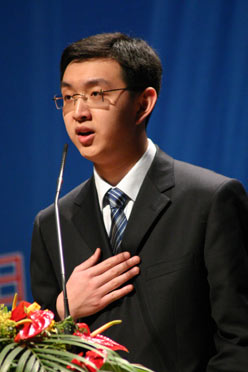Last month, I happened to watch an interview of a Chinese student studying
abroad. At one point the hostess asked: "For how long have you been away from
home?" "Three years," he said. "How do you keep in touch with your parents?" "We
wrote emails," the young man replied proudly. "Then I guess your parents learned
how to send an email just because of you, right?" Having heard this from the
hostess, the young man was speechless for a long time. Indeed, in the world
today, it is not easy for the elder generation to keep up to date with the rapid
development of technology.
 This story reminded me of my concerns when I first left home for
college three years ago: My parents don't understand English. They couldn't
identify the buttons marked in English on our remote controls. So when I was
away from home, who would help them select Chinese subtitles when they wanted to
watch a foreign movie on our DVD? My parents don't use pinyin, the phonetic
symbols for Chinese. Therefore, they couldn't input Chinese characters into
their cell phones using the keyboard. Without me, whom could they depend on when
they needed to reply to a text message? I worried a lot, so before I left, I
carefully prepared a flow chart on how to operate the DVD player, and stored as
many template messages in my parents' phones as I could possibly think of.
This story reminded me of my concerns when I first left home for
college three years ago: My parents don't understand English. They couldn't
identify the buttons marked in English on our remote controls. So when I was
away from home, who would help them select Chinese subtitles when they wanted to
watch a foreign movie on our DVD? My parents don't use pinyin, the phonetic
symbols for Chinese. Therefore, they couldn't input Chinese characters into
their cell phones using the keyboard. Without me, whom could they depend on when
they needed to reply to a text message? I worried a lot, so before I left, I
carefully prepared a flow chart on how to operate the DVD player, and stored as
many template messages in my parents' phones as I could possibly think of.
Fortunately, my efforts did work for my parents. However, what makes me more
optimistic is that society at large is becoming more concerned about the elder
generation, and the fruit of technological innovation is no longer believed to
be an asset only for the young people. Today, with simple Chinese instructions
on the remote control, even my 80-year-old grandfather can play his favorite TV
program on a DVD. Last year, with the money I earned from a part-time job, I
bought my mother a new cell phone which supports handwritten messages instead of
inputting words through a keyboard. And now, my mother no longer has to use the
templates messages I've stored for her, instead, she now sends me messages as
long as 300 words. The joy I have when reading those text messages is
inexpressible, not only because of the words she writes, but also because our
technology has indeed become a real blessing in her life.
Two years ago, the counter service in our neighborhood bank was replaced by
an ATM station. With those intelligent machines, people can carry out all their
regular banking services. My father, however, was not used to such a change.
Thereafter, he always walked three blocks further to a bank with a counter to
use their services. In the future, however, this will no longer happen, because
when I went to that ATM station again last spring festival, I found a delightful
change: the terminals there have adopted a voice guidance system. While I was
there, I noticed a grey haired man using the voice instructions. And despite his
hesitation between pressing the buttons, he left the bank with a satisfactory
smile. What a marvel! My vision for the future was unfolding before my very
eyes. At that moment, I rejoiced thinking of my father, someday, standing there
using the banking service. I rejoiced thinking of myself that when I become old,
the new inventions can still ease my life rather than making the life harder.
